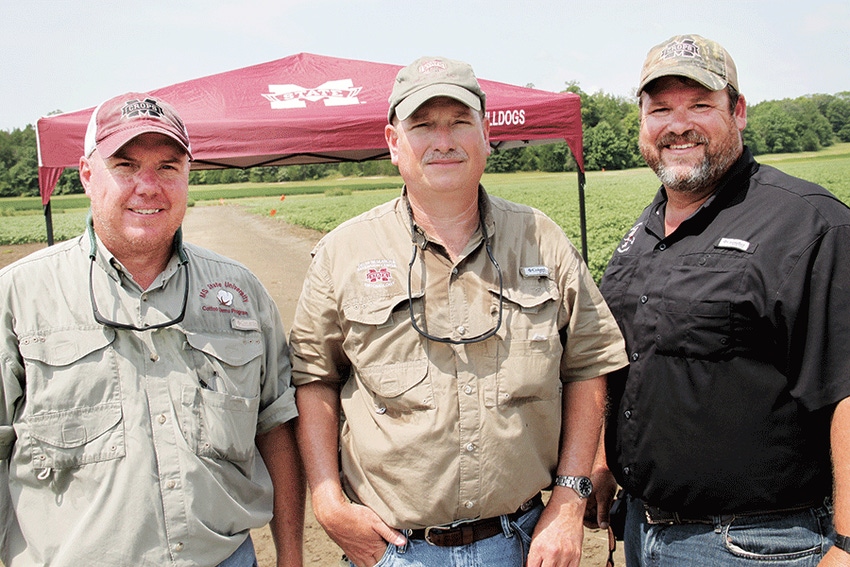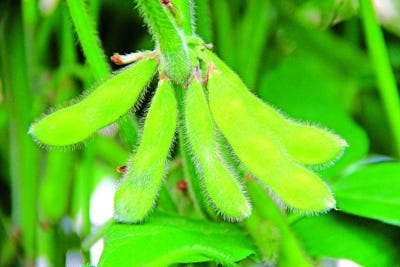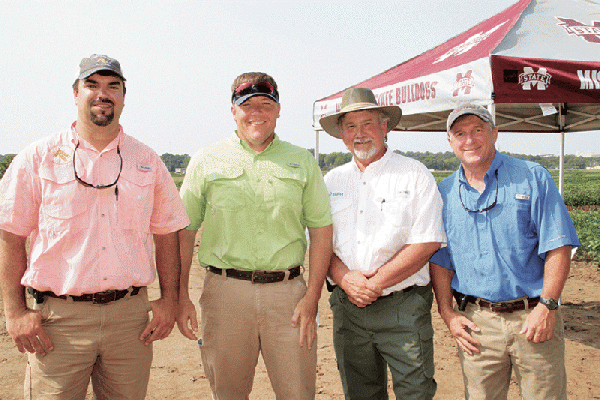
Mississippi specialists say Bt soybean technology ‘impressive,’ but not available to U.S. growers
“We’ve been working with this technology in our caterpillar tests for several years — it works, and it looks good,” says Don Cook, assistant research professor at the Mississippi Delta Research and Extension Center.

Bt soybeans, widely planted in South America but not available in the U.S., will offer growers another option for control of caterpillar species if the technology is approved here, Mississippi State University specialists say.
Several million acres of Monsanto’s Intacta RR2 Pro Bt soybeans have been grown in South America since 2013, but no timetable has been announced for their commercialization in the U.S.
“We’ve been working with this technology in our caterpillar tests for several years — it works, and it looks good,” says Don Cook, assistant research professor at the Delta Research and Extension Center, who discussed the technology at a recent MSU Technology Field Day at the university’s R.R. Foil Plant Science Research Center at Starkville.
Stay current on what’s happening in Mid-South agriculture: Subscribe to Delta Farm Press Daily.
The soybeans combine three benefits in one product: Protection against the major worms that attack soybeans, such as velvetbean caterpillar, soybean looper, corn earworm, lesser cornstalk borer, and cotton bollworm (Helicoverpa armigera); increased yield potential; and tolerance to glyphosate herbicide with the Roundup Ready 2 Yield trait technology..
“We think the best fit for Mississippi growers, and where they will get the most benefit, is with later planted beans,” Cook says. “With earlier beans, those planted before April 20, we generally don’t have enough insects to cause problems. It’s in the later-planted beans where we see the most insect pressure, including caterpillar pests.”
Cook says if Bt soybeans are approved for planting in the U.S., there will most likely be a structured refuge requirement with the technology. The required refuge could be as high as 50 percent.
Check Current Soybean Futures Prices
“The diamide insecticides are very good against caterpillar pests of soybeans and growers have been relying heavily on these products. The Bt technology along with the other caterpillars products could take some of the pressure off of the diamides.
“As with any pest management tool,” Cook says, “we will emphasize the need not to overuse this technology in order to reduce potential for development of resistance.”
'We've seen essentially zero survival'
Angus Catchot, MSU Extension professor of entomology and plant pathology, says, “Depending on the crop year, we’ve had an opportunity to see this technology against every caterpillar pest, and the results have been impressive. Under extreme insect pressure with this Bt technology, we have seen essentially zero survival.

“We’ve been working with the Bt soybean technology in our caterpillar tests for several years — it works, and it looks good,†says Don Cook, assistant research professor at the Delta Research and Extension Center.
“If a 50 percent refuge is what it takes to get this technology,” Catchot says, “it will find a fit in many operations. But for those who don’t need it, there will still be elite soybean germplasm, so growers will have an option for varieties without the technology.”
When Bt soybeans may be available in the U.S. is unknown, he says.
“But we’ve seen them in the field in South America, and they looked very good against high pest pressure. Growers there were extremely happy with them.
“The varieties being planted in South America overlap with those grown in the Mid-South,” Catchot says, “so there could be quick transition to the market here, if the company should decide to go ahead with it. But we’re told they’re still working on the refuge details, so we really don’t know when this technology may be available here.”
New weed control technologies are also available or in the pipeline for soybeans, the MSU specialists told field day attendees.
An additional option for broadleaf weeds

Trent Irby, from left, Mississippi State University assistant Extension professor of plant and soil sciences; Jason Bond, Extension/research professor at the Delta Research and Extension Center; Larry Walton, Dow AgroSciences; and Anthony Mills, Monsanto, gave growers a preview of new crop technologies at a recent MSU field day.
Enlist soybeans from Dow AgroSciences combine tolerance to a new 2,4-D, glyphosate, and glufosinate to offer an additional option for yield-robbing broadleaf weeds, including resistant and hard-to-control species, says Trent Irby, assistant Extension professor of plant and soil sciences at MSU.
Tolerance to 2,4-D will mean fewer plant-back restrictions, he says. Growers can plant Enlist soybeans immediately after applying 2,4-D for burndown.
Enlist Duo, now federally registered in many key soybean-producing states, including Mississippi, Louisiana, Arkansas, and Missouri, combines two proven products, a new 2,4-D and glyphosate, to help manage tough weeds, he says.
Roundup Ready 2 Xtend soybean technology from Monsanto has been deregulated in the U.S., but has not been released in the U.S. pending approval in China. Enlist soybeans have also not been released in the U.S.
This technology will offer soybean tolerance to both dicamba and glyphosate. A public comment period is expected soon, and upon approval in China, it is hoped that the technology will be available in the U.S. for the 2016 season.
Roundup Xtend Herbicide will be a premix of the herbicides dicamba and glyphosate, designed to manage weeds before planting and as an over-the-top option on Roundup Ready II Xtend crops during the season.
Another technology in the pipeline for soybean weed control and resistance management, Irby says, is Balance GT soybeans, which is expected to offer crop tolerance to both isoxaflutole and glyphosate.
Bolt technology, a new herbicide-tolerant trait available in select U.S. soybean varieties, will give farmers additional options and flexibility for managing glyphosate-resistant weeds, Irby says.
Pioneer brand T Series soybeans with the Roundup Ready trait and Bolt technology are available to farmers in maturity groups IV and V.
The Bolt technology will help farmers reduce weed competition from planting through harvest by enabling new uses for proven, field-tested herbicides."
Bolt technology provides soybeans with enhanced tolerance to DuPont LeadOff and DuPont Basis Blend herbicides to give farmers more burndown options in reduced or no-till situations.
About the Author(s)
You May Also Like



